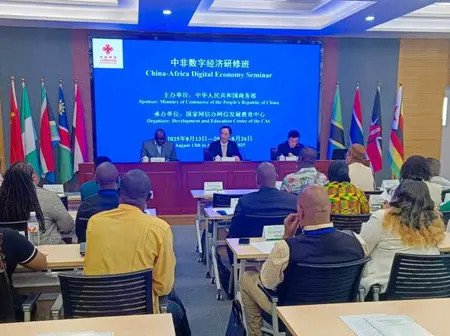China has reiterated its commitment to strengthening international exchanges and cooperation with African countries in cyberspace, aiming to advance the Digital Innovation Project of the Forum on China-Africa Cooperation (FOCAC).
Speaking at the China-Africa Digital Economy Seminar in Beijing, Zhang Yong, Director General of the Development and Education Center of the Cyberspace Administration of China (CAC), noted that the rapidly evolving digital landscape offers significant opportunities for collaboration between China and Africa. He highlighted China’s commitment to assisting African nations in developing digital infrastructure, advancing emerging technologies such as 5G, artificial intelligence, and cloud computing, and fostering inclusive growth through cross-border e-commerce and smart city initiatives.
“This seminar represents a concrete step by China to strengthen cooperation with African partners in cyberspace,” Zhang said. “We hope participants will deepen their understanding of building a community with a shared future in cyberspace, enhance capabilities to drive digital economy growth, and actively foster exchanges that benefit both sides.”
Zhang referenced the concept of a community with a shared future in cyberspace, first proposed in 2015 by President Xi Jinping, who called for the international community to collaboratively advance development, ensure security, participate in governance, and share benefits.
“Building a secure, stable, and prosperous cyberspace is of great significance for individual countries and for world peace and development,” he asserted.
He outlined three key priorities for participants: strengthening consensus on cyberspace governance, building capacity to harness the digital economy for high-quality growth, and deepening practical exchanges through study tours in Chinese cities such as Wuxi and Qingdao.
Zhang noted that while Africa’s digital economy is rapidly expanding, it faces challenges related to infrastructure, technology adoption, talent development, and governance. He made a case for deepening of understanding of digital economy governance policies and effective strategies to promote secure and sustainable growth.
Patrick Baloyi from the Johannesburg Metropolitan City in South Africa highlighted the necessity of addressing digital inequality, pointing out that South Africa’s “two economies” – one modern and globally integrated, the other underdeveloped – mirror broader challenges faced across the continent.
“How do we ensure that access to data is regarded as a human right rather than a luxury?” Baloyi posed. “We must learn from China’s journey to becoming a global digital powerhouse and ensure technology serves all citizens, not just the few.”
Prof. Abdou Karim Jallow, Director General of the Gambia Information and Communication Technology Agency (GICTA), welcomed China’s commitment, noting successful partnerships with companies like Huawei in deploying LTE networks and enhancing national data infrastructure.
“These achievements reflect more than technical progress; they speak to trust, mutual respect, and a shared vision for the future,” Jallow remarked.
He described the seminar as a timely opportunity to address challenges in digital policy, governance, and emerging technologies such as generative AI, expressing gratitude to China’s Ministry of Commerce and CAC for their support.
The seminar convened 37 delegates from eight African countries – Egypt, Kenya, Namibia, Nigeria, South Africa, Tanzania, The Gambia, and Zimbabwe – representing government, enterprises, and research institutions. Its goal is to equip participants with practical skills, governance insights, and networks to advance Africa’s digital transformation.

Leave a Reply